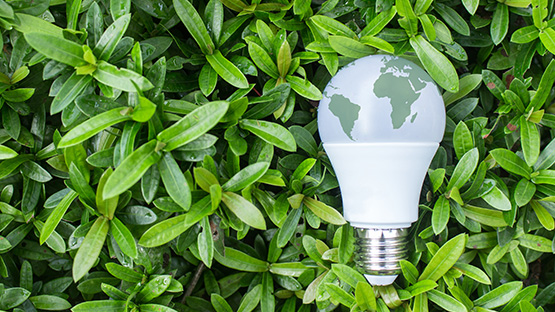Functional ecology - definition. What does it do?
Ecology

14 February 2023
Ecology is associated with caring for nature, and the adjective 'ecological' itself is used to describe something that favours the environment. Meanwhile, ecology is a whole field of science that studies a completely different aspect of the natural system. It is also divided into subcategories, of which we distinguish functional ecology, among others. In this article, we introduce the basic ecological concepts and explain what functional ecology does. This will help you understand exactly what sustainability is and how to take care of it.
Functional ecology - what is it?
Before going on to explain the concept of functional ecology, it would be useful to explain what ecology itself actually does. This is because it is a branch of science that studies the interactions between individual organisms, as well as the interactions of different ecosystems. As you can see, it is a broader concept than just caring for the environment, to which the science called sozology relates. Recycling, on the other hand, is related to environmentalism, which takes care of the removal of all harmful objects and substances from the ecosystem.
So what will functional ecology be? It is a branch of ecology that is associated with a specific research methodology. Functional ecology focuses on the functions that individual species perform in an ecosystem and how they affect each other. For example, if one predator species is missing among the animals in a particular environment, the ecosystem will change and its balance will be upset. The very concept of functional ecology was introduced by Charles J. Krebs by distinguishing it from the general science of ecology together with descriptive and evolutionary ecology.
Ecology - definition for children
The concept of ecology is introduced at the early stages of education. This is important so that children also learn about what 'ecological' means, how to act ecologically and, above all, how to take care of our planet in harmony with nature. Ecology can be explained to children in a slightly simpler way as the science of the environment that is our home. Being green therefore means taking care of nature, animals, plants and soils - in short, being friendly to the planet. Recycling and other activities are promoted from an early age to avoid the consequences of polluting the environment.
Areas of interest for functional ecology
In a general sense, functional ecology is concerned with the study of how individual organisms on the planet affect each other. It is therefore interested in the joint functioning of living beings, discovering connections based on mutual interactions. Functional ecology also seeks general principles of how plants and animals function in nature. It is the task of functional ecologists not only to search for these connections, but also to describe them.
Learning as much as possible about these relationships involves taking an analytical approach and breaking the work down into smaller parts. This means that research is carried out on both a broad and a slightly narrower scope, which is then put together. A specific functional niche is studied - ecology has distinguished the concept of an ecological niche, which refers to a specific place/area occupied by a species. Each can only occupy one niche - this is linked to competition between species. In this area, the ecologist is interested in the reason for the distribution of a species in a particular niche (this may be related to the way it reproduces, overwinters, etc.). In this context, there may be a geographical cause, linked to the presence of specific climatic features.
Ecology - basic concepts
This article deals with the concept of ecology, the foundations of ecology and an explanation of functional ecology. However, in order to thoroughly understand the scope of the ecological research carried out, it is useful to familiarise oneself with the basic concepts, one of which is the notion of the biosphere - a sphere of life composed of biomes. A biome, in turn, is any microclimate such as tundra or taiga. Another term worth assimilating is population. It does not refer only to humans - a population is a group of individuals of a given species living in the same area and at the same time.
Functional ecology and other sciences - genetics, evolutionary biology, meteorology
Ecology itself is an interdisciplinary science, which means that the field it studies links to other scientific disciplines. In the context of functional ecology, links can be seen with genetics, evolutionary biology and even meteorology. It is also linked to branches of science such as astronomy. Ecology can also be linked to philosophy and there are references to physiology. The multitude of such connections leads to the creation of different fields of ecology, which are classified according to their interests.
We have, for example, biocenosis ecology, which studies the effects of interactions between species on the biocenosis (i.e. the set of populations in composition with the plants, animals and micro-species that together make up a given environment). The scope of research in this field can be linked to the study of functional ecology. The different disciplines have distinguished themselves since ancient times, and this does not mean that it is in competition with functional ecology - quite the contrary. Each branch of science can collaborate with each other, share findings and thus broaden the scope of research and its results.
Scope of research in contemporary functional ecology
Functional ecology is characterised by a modern approach to the scope of the study of ecology and focuses on currently existing species. It does not examine the relationships between once existing animals or plants, and is limited to those that make up the modern ecosystem. The opposite of modern functional ecology is evolutionary ecology, which deals, as it were, with our natural heritage. While functional ecology studies the relationships between the occurrence of a species within a region, and the interactions between species, evolutionary ecology looks for historical causes.
For example: functional ecologists can study the impact that specific trees have on the environment in which they grow. They establish that trees have a specific function in the forest: they enhance the soil, create a special microclimate for the development of other living beings (plant as well as animal). The ecosystem is considered as a whole, in which each component plays an important role. Such work can therefore be likened to the studies of anatomists, who determine how the work of specific organs affects the human body. 
The impact of functional ecology on our daily lives - is it noticeable?
The work of functional ecology aims not only to be scientific, but also educational. This means that an ecologist working in this field wants to impart knowledge to people about how to manage the planet in the most beneficial way for the biosphere. This education concerns, among other things, the use of natural resources - to what extent we as users of the environment can draw on the Earth's resources (which are mainly natural resources) so as not to create imbalances in the ecosystem. The ecology of action and the educational materials of ecology that we can use to take care of the environment are presented.
The very notion of environmentalism is prevalent in our daily lives. We separate our rubbish, switch from car to bicycle and drink water from the tap instead of that bottled in plastic. Does the functional field of ecology also manifest itself in our everyday functioning? Well, yes! From time to time we hear warning signals from various environmental organisations about the risk of extinction of a species. As part of an ecosystem in which all entities should enjoy the same rights, we cannot take such information lightly. The extinction of one species leads to an imbalance in the environment and has serious long-term consequences for the whole system.
Why is functional ecology important for the proper functioning of the planet?
Above all, functional ecology allows us to understand what sustainability is all about. We won't be able to take proper care of it if we don't understand the interconnections between individual species and their impact on shaping the environment. Although the main polluters of the planet are large factories, as well as the mining, livestock and textile industries, each individual human being can contribute to improving the overall condition of the Earth. As co-creators of our planet's ecosystem, we should take care to maintain species diversity according to recommendations based on the research of functional ecologists.
This article presents information related to the departments of ecology, the principles of ecology and basic concepts. You already know what functional ecology is, how it is related to the environment around us. By explaining how living organisms interact with each other, it gives you a better understanding of what sustainability is and how, as users of the ecosystem, we directly influence it.
Czytaj również






